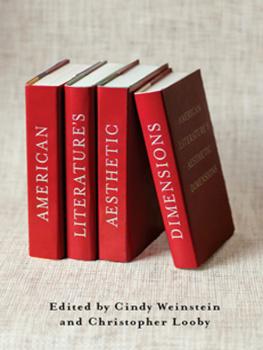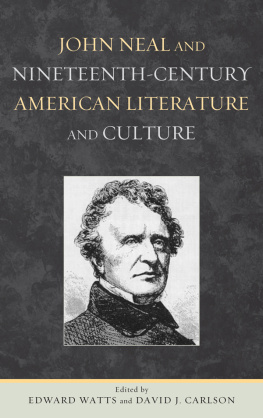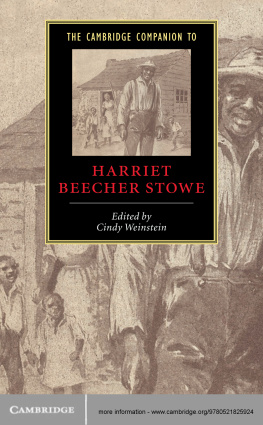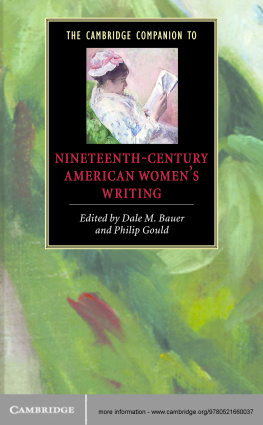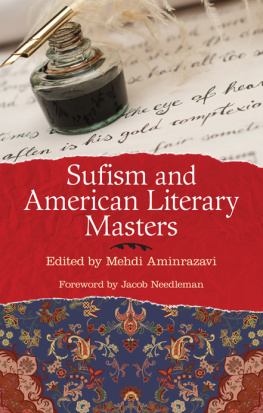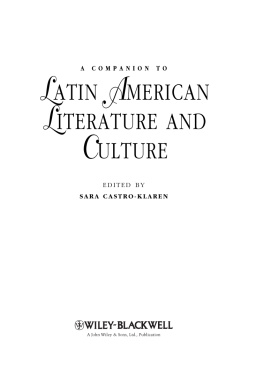American Literatures Aesthetic Dimensions
American Literatures Aesthetic Dimensions
EDITED BY
CINDY WEINSTEIN
AND
CHRISTOPHER LOOBY

Columbia University Press New York
Columbia University Press
Publishers Since 1893
New York Chichester, West Sussex
cup.columbia.edu
Copyright 2012 Columbia University Press
All rights reserved
E-ISBN 978-0-231-52077-5
Library of Congress Cataloging-in-Publication Data
American literatures aesthetic dimensions / edited by Cindy Weinstein and Christopher Looby
p. cm.
Includes bibliographical references and index.
ISBN 978-0-231-15616-5 (cloth: acid-free paper)
ISBN 978-0-231-15617-2 (pbk.: acid-free paper)
ISBN 978-0-231-52077-5 (e-book)
1. American literatureHistory and criticism.
2. LiteratureAesthetics. I. Weinstein, Cindy. II. Looby, Christopher.
PS88.A49 2012
810.9dc23
2011039141
A Columbia University Press E-book.
CUP would be pleased to hear about your reading experience with this e-book at .
References to Internet Web sites (URLs) were accurate at the time of writing. Neither the author nor Columbia University Press is responsible for Web sites that may have expired or changed since the book was prepared.
To our teachers
Contents
Some of the essays included here originated as talks given at a conference at the Huntington Library on October 2627, 2007, also with the title American Literatures Aesthetic Dimensions. We wish to thank Robert C. Ritchie, formerly W. M. Keck Foundation Director of Research at the Huntington, for his support of the conference (which was generously funded by the William French Smith Endowment), as well as Caroline Powell and Susi Krasnoo for their kind organizational assistance. Several friends and colleagues served as chairs and moderators (Alison Hills, Catherine Jurca, Maria Karafilis, Samuel Otter, Nancy Ruttenburg, and Elisa Tamarkin), and they, along with the many members of the lively audience, deserve our thanks as well. Those who spoke at the conference (Edward Cahill, Christopher Castiglia, Max Cavitch, Julie Ellison, Jonathan Freedman, Dorothy J. Hale, Eric Lott, Trish Loughran, Sianne Ngai, Wendy Steiner, Cindy Weinstein, and Ivy Wilson) benefited greatly from the exchanges and challenges that the conference enabled. The published collection now includes a host of essays not originating at the conference (those by Dorri Beam, Nancy Bentley, Mary Esteve, Christopher Looby, Elisa New, and Sianne Ngaiwhose essay here is different from the talk she gave at the conferenceas well as the afterword by Charles Altieri), and we thank them for adding their contributions to the conversation already in progress.
Our editor at Columbia University Press, Philip Leventhal, has been interested, understanding, patient, and strongly supportive (when necessary), and we have greatly enjoyed working with such a talented editor. Our deep gratitude goes also to Alison Alexanian and Susan Pensak for seeing this volume through the editorial and production process so deftly and wisely. The reviewers for the press gave us astute and pointed advice, which we have tried to use to the collections advantage; they deserve our sincere thanks, and it is a pleasure to express our gratitude to one of them (James Davis of Brooklyn College) by name. We would also like to thank colleagues in the field, many of whom appear in this volumes notes, for helping to bring this book to fruition. They include Hester Blum, Gregg Crane, Mark Eaton, Michael Gilmore, Karen Jacobs, Wyn Kelley, Mark Maslan, John Matthews, Geoff Sanborn, Peter Stoneley, Ezra Tawil, and Robert von Hallberg. Many thanks to Jonathan Katz, chair of Caltechs Division of Humanities and Social Sciences, for his financial support of the project.
Several of these essays have been previously published elsewhere, and we are grateful for permission to reprint them here. Max Cavitch, Stephen Cranes Refrain, is reprinted by permission from ESQ: A Journal of the American Renaissance 54 (2008): 3354, copyright 2008 by the Board of Regents of Washington State University. Wendy Steiners essay provided much of the material for the conclusion to her recent book, The Real Real Thing: The Model in the Mirror of Art (Chicago: University of Chicago Press, 2010), and is reprinted by permission of the University of Chicago Press, copyright 2010 by the University of Chicago. Cindy Weinstein, When Is Now? Poes Aesthetics of Temporality, is reprinted by permission from Poe Studies/Dark Romanticism: History, Theory, Interpretation 41 (2008): 81107, copyright 2008 by the Board of Regents of Washington State University. An earlier version of Jonathan Freedmans essay, What Maggie Knew: Game Theory, The Golden Bowl, and the Possibilities of Aesthetic Knowledge, was published in the Cambridge Quarterly 37, no. 1 (2008): 98113 and is reprinted by permission of Oxford University Press, copyright the author. Dorothy J. Hale, Aesthetics and the New Ethics: Theorizing the Novel in the Twenty-First Century, is reprinted by permission of the Modern Language Association of America from PMLA 124 (2009): 896905, copyright 2009 by the Modern Language Association of America. Eric Lott, Perfect Is Dead: Karen Carpenter, Theodor Adorno, and the Radio; or, If Hooks Could Kill, is reprinted by permission of Criticism: A Quarterly for Literature and the Arts 50 (2008): 21934, copyright 2009 by Wayne State University Press.
The collection is dedicated to our teachers, and that is by now a very large category for both of us, given how much we know we have learned over the years from numerous instructors, colleagues, and friendstoo many to be named here. But Christopher Looby wishes to single out one particular teacher to whom to dedicate his contributions to this volumeone out of many inspirational undergraduate and graduate professors he could name, along with all those fellow students, departmental colleagues, and wise friends whose intelligence and learning he has been pleased to enjoy and exploit. Sacvan Bercovitchs rare combination of acute intelligence, prodigious learning, and scholarly imagination continue to represent for him a beautiful and unmatched ideal of critical accomplishment. Cindy Weinstein has been fortunate to study with the very best of teachers (and friends) at Brandeis and Berkeley, but she wishes to dedicate her contributions to this volume to Michael Gilmore and Eric Sundquist. Their exemplary scholarship and steadfast friendship have been her foundation and ideal.
The political potential of art lies only in its own aesthetic dimension.
HERBERT MARCUSE, The Aesthetic Dimension
For a long time, what made American literature distinctive, even exceptional, was held to be its aesthetic particularity: its characteristic organic form, its embrace of romance rather than realism, its colloquial style, or some other discovered or invented aesthetic quality. Then it came about that this critical use of aesthetic categories to identify and analyze American literature was considered spurious and politically suspectheld to constitute a dangerous and morally blameworthy evasion of history and political reality. So for many years the predominant approach in American literary studies, as in many other sectors of the academic humanities, was a politically engaged historicism, and the aesthetic dimension was consciously dismissed (although never, to be sure, successfully avoided) as a matter of minor importance, trivial distraction, or accidental detail. In recent years, this dismissal has come to seem, to many of us, limiting or deforming to critical inquiry and scholarly investigationand so it comes about that aesthetic questions return to the critical conversation, perhaps in fruitful conjunction with the historicist and political questions that have earned their central position in our inquiries.
Next page
